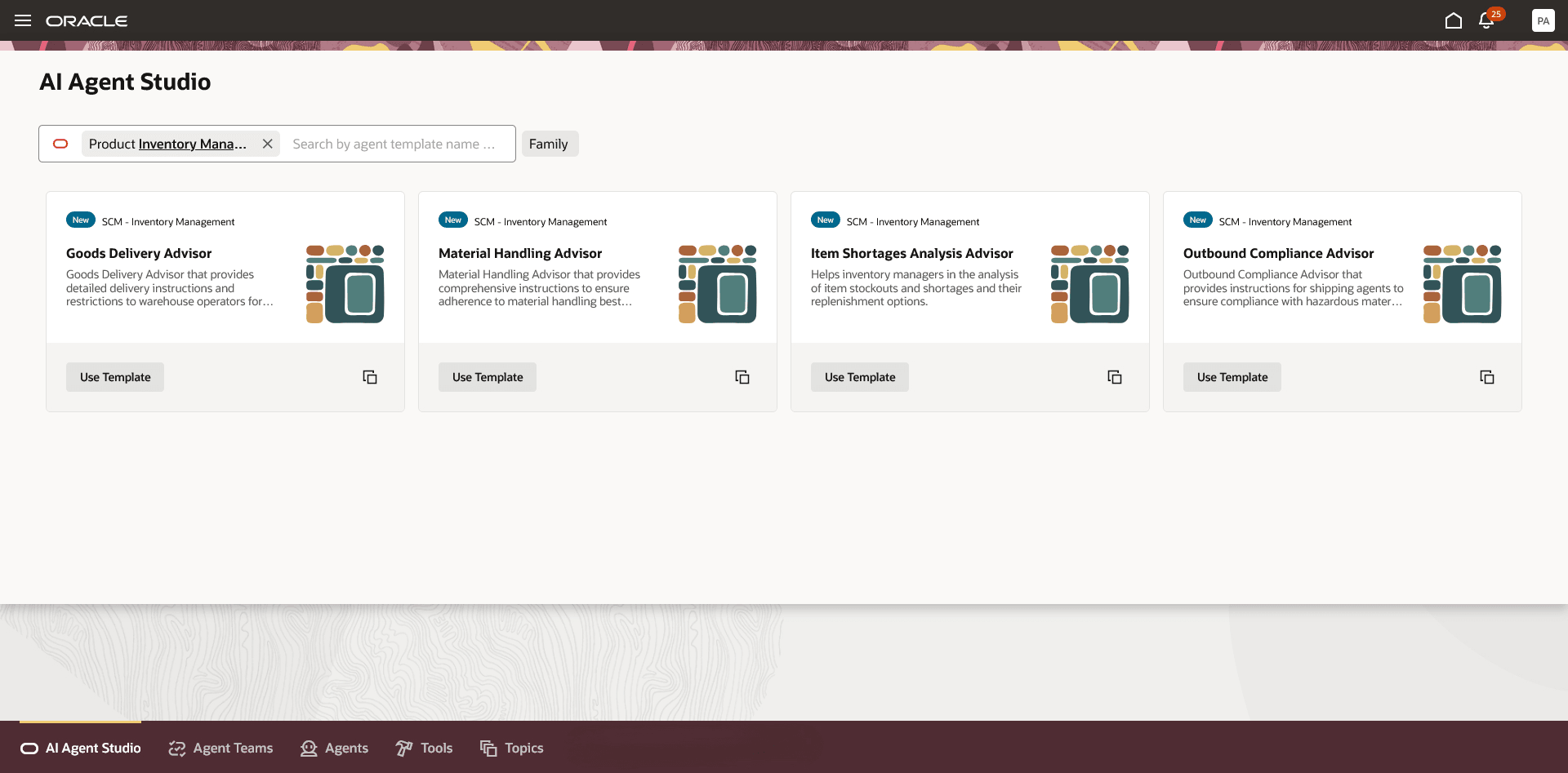AI Agent: Outbound Compliance Advisor, Material Handling Advisor, Goods Delivery Advisor, and Item Shortages Analysis Advisor
Oracle AI Agent Studio empowers Oracle Fusion Cloud Applications customers and partners to easily create, extend, deploy, and manage AI agents and agent teams across the enterprise. In the 25A update of Oracle Fusion Cloud Inventory Management, detailed steps were provided for creating the Outbound Compliance Advisor, Material Handling Advisor, and Goods Delivery Advisor AI agents using the guided journeys on their respective Redwood pages. Now, these three AI agents, along with the Item Shortages Analysis Advisor, are available as templates in Oracle AI Agent Studio. Here are some example use cases for what you can accomplish with these templates:
| Agent Name | Description |
|---|---|
| Material Handling Advisor | Provides comprehensive instructions to ensure adherence to material handling best practices, focusing on:
|
| Outbound Compliance Advisor | Provides instructions for shipping agents to ensure compliance with hazardous material placard regulations by:
|
| Goods Delivery Advisor |
Provides detailed delivery instructions and restrictions to warehouse operators for designated delivery locations, including:
These guidelines aim to ensure that deliveries are completed efficiently and in compliance with location-specific requirements. |
| Item Shortages Analysis Advisor |
Assists inventory managers in assessing, analyzing, and resolving item shortages and stockouts by:
The agent uses the Configure Item Shortage Parameters setup to evaluate shortages and stockouts, and the user's configured job role must include the privileges required to access the Item Shortages page. |
Prebuilt AI agents using the Tool document type are available in the AI Agent Studio tab. You can use these ready-made templates to quickly create an agent team, which can then be added to a guided journey on a Redwood page.

Seeded AI Agent Templates
Prebuilt AI agents simplify the setup process by reducing the steps needed to create agents. They can be easily copied to create an agent team, helping you get started quickly and saving valuable time.
Steps to Enable and Configure
You can use AI Agent Studio to use or copy a preconfigured agent template to create Agents for your business processes. To automatically add a suffix to all artifacts in your agent team, you can Copy Template instead of Use Template. When you copy a template, you're directly taken to the agent team canvas where you can edit the agent team settings, agents, tools, and topics. The Use Template option takes you through a step-by-step process for configuring each artifact in the agent team.
For information on using AI Agent Studio, see How do I use AI Agent Studio?
Tips And Considerations
If you created any AI agents in the applications before update 25C, we recommend that you replace your existing agent with an agent you create in Oracle AI Agent Studio for Oracle Fusion Cloud Applications. You can migrate the document tool you created for your existing agent to AI Agent Studio.
Here’s how:
- Go to My Client Groups > Show More > Configure RAG Agents.
- Click the Tools tab, then click Migrate action for your tool.
- Enter a unique name and tool code, and select the relevant family and product for your agent. You’ll use the tool name to locate your tool in AI Agent Studio.
- Click OK.
After your tool is migrated, create a new agent in AI Agent Studio using the appropriate template, add your migrated tool, and publish your agent. Then, create a new guided journey and add an agent task of the type Workflow Agent for the new agent you just created in AI Agent Studio. Next, update the guided journeys with the new journey code where you’ve enabled your previous agent so that the journeys use the new agent. After you have tested and verified your new agent, you can use the Delete action in Configure RAG Agents to remove the original agent.
Key Resources
- Oracle Fusion Cloud SCM: Using Inventory Management guide, available on the Oracle Help Center.
Access Requirements
To access the Oracle AI Agent Studio for Fusion Applications and manage SCM AI agents, users must be assigned a configured job role that contains these duty roles:
- SCM Intelligent Agent Management Duty (ORA_RCS_SCM_AI_AGENT_MANAGEMENT_DUTY and ORA_RCS_SCM_AI_AGENT_MANAGEMENT_DUTY_HCM – both duty role codes are required)
- Fai Genai Agent SCM Administrator Duty (ORA_DR_FAI_GENERATIVE_AI_AGENT_SCM_ADMINISTRATOR_DUTY)
In the Security Console, filter by Roles and Privileges to find the SCM Intelligent Agent Management Duty role. Filter by Roles and Permission Groups to find the Fai Genai Agent SCM Administrator Duty role.
To interact with AI agents in product pages, users must be assigned a configured job role that contains this duty role:
-
Fai Genai Agent Runtime Duty (ORA_DR_FAI_GENERATIVE_AI_AGENT_RUNTIME_DUTY)
In the Security Console, filter by Roles and Permission Groups to find this duty role.
To allow users to interact with agents, you must also enable permission groups in the Security Console on those users’ configured job roles that contain the Fai Genai Agent Runtime Duty role. You can enable permission groups when you manage the basic information of your configured job roles.
Users’ configured job roles must also contain privileges that allow access to the pages where AI agents are enabled.